Introduction: The Ultimate Guide to Job Interview Preparation
You’ve landed an interview for your dream job. Congrats! The next step is to start preparing for the interview so you can make a great impression and land the job. This guide will teach you everything you need to know about preparing for a job interview, including the importance of preparation, the different types of preparation, and the most effective strategies and techniques. By the end of this guide, you’ll be ready to ace your interview and get the job you want.
The Benefits of Job Interview Preparation
There are many benefits to preparing for a job interview. In addition to making a great first impression, preparation can help you feel more confident and relaxed during the interview. It also allows you to focus on the questions you’re asked and avoid getting nervous or flustered. Additionally, preparing for the interview gives you the chance to practice your answers to common interview questions. This way, you can be sure that you’re giving the best possible answers to the interviewer’s questions.The Different Types of Job Interview Preparation
There are a few different types of job interview preparation. The first is research. You should take some time to research the company, the position you’re applying for, and the industry. This will help you be more prepared to answer questions about the company and the job. It will also help you understand the interviewer’s perspective and what they’re looking for in a candidate.
The second type of job interview preparation is practice. You should practice your answers to common interview questions. This will help you feel more confident and relaxed when you’re actually in the interview. Additionally, it’s a good way to ensure that you’re giving the best possible answers to the interviewer’s questions.
The third type of job interview preparation is mock interviews. A mock interview is a practice interview that you have with someone who isn’t actually interviewing you for a job. This can be a friend, family member, or even a professional interview coach. Mock interviews are a great way to get practice interviewing and to receive feedback on your performance.
The Most Effective Job Interview Preparation
Before delving into the strategies, let’s understand why interview preparation is crucial:
- First Impressions Matter: An interview is your chance to make a positive first impression on a potential employer. A well-prepared candidate demonstrates professionalism and commitment.
- Competitive Edge: In today’s competitive job market, preparation can give you a competitive edge over other candidates.
- Confidence Boost: Knowing you’re well-prepared boosts your confidence, helping you perform better during the interview.
Interview Success Strategies
1. Research the Company
- Company Background: Start by thoroughly researching the company’s history, mission, values, and recent news. Understanding the company culture is essential.
- Job Description: Carefully review the job description to align your skills and experiences with the requirements.
2. Practice Common Interview Questions
- Behavioral Questions: Prepare answers for common behavioral questions, using the STAR (Situation, Task, Action, Result) method to structure your responses.
- Technical Questions: If applicable, be ready to answer technical questions related to your field.
3. Develop Your Personal Brand
- Elevator Pitch: Craft a concise and compelling elevator pitch that highlights your qualifications and enthusiasm for the role.
- Unique Selling Points: Identify your unique selling points and weave them into your responses.
4. Dress for Success
- Professional Attire: Choose a professional outfit that aligns with the company’s dress code.
- Grooming: Pay attention to grooming and personal hygiene.
5. Prepare Questions
- Ask Questions: Prepare thoughtful questions to ask the interviewer about the company, team, and role. It demonstrates your genuine interest.
6. Mock Interviews
- Practice Interviews: Conduct mock interviews with a friend or career coach to simulate the interview experience.
- Feedback: Seek feedback to improve your interview skills.
7. Mindset and Confidence
- Positive Mindset: Maintain a positive attitude and visualize a successful interview.
- Breathing Exercises: Practice relaxation techniques to manage nerves.
8. Logistics
- Travel Arrangements: Plan your transportation and arrive at the interview location with time to spare.
- Documentation: Bring multiple copies of your resume, references, and any required documents.
During the Interview
9. Body Language
- Eye Contact: Maintain good eye contact to convey confidence and engagement.
- Posture: Sit up straight to appear attentive and interested.
10. Active Listening
- Listen Actively: Pay close attention to the interviewer’s questions and respond thoughtfully.
- Clarify: If you’re unsure about a question, don’t hesitate to ask for clarification.
Conclusion
Interview success is not a matter of luck; it’s a result of careful preparation and effective strategies. By following this ultimate guide, you’ll be well-equipped to shine in your next job interview, impress potential employers, and open doors to exciting career growth opportunities.
Remember that each interview is a valuable learning experience, regardless of the outcome. Continuously refine your interview skills, gather feedback, and adapt your approach based on your experiences. With dedication and practice, you’ll become a master of interview success.
Are there any specific interview challenges or questions you’d like more guidance on? Feel free to share in the comments below!
